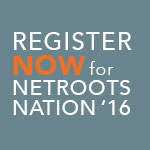After a great run, the Winning the Internet blog has been retired. However, you can still keep in touch with New Media Mentors here.
 As we gear up for Netroots Nation 2013, we’re taking a closer look at some of the convention’s hottest training sessions. We’re interviewing the trainers and taking you inside some of online activism’s most popular and elusive topics.
As we gear up for Netroots Nation 2013, we’re taking a closer look at some of the convention’s hottest training sessions. We’re interviewing the trainers and taking you inside some of online activism’s most popular and elusive topics.
Today we’re interviewing Evan Sutton, who’ll be leading Write Like You Mean It: How to Write Advocacy Emails That Motivate People.
NN13 Training Session
Write Like You Mean It: How to Write Advocacy Emails That Motivate People
Think of your favorite book and the way you feel when you open it. Now imagine: wouldn’t it be nice if advocacy emails were actually fun to read, too? In this session, we’ll teach you how to make your emails reach people at a deeper level through storytelling, the power of voices and language that speaks to people’s senses, not just their sense of outrage. We’ll use case studies to illustrate effective email structure and how to create a theory of change that makes sense and how to implement creative writing techniques to craft emails that people want to read all the way through. We’ll discuss finding authentic voices for your content, and connecting with your audience on a deeper level.
Interview
Q: Tell us about your experience writing advocacy emails.
A: I began writing advocacy emails in 2010, shortly after starting at NOI. I got to learn from some really great people — like Lola Elfman, Matt Compton, Patrick Schmitt. Through my position at NOI, I’ve seen — and helped consult — dozens of different email campaigns for everything from hyper-local elections to national issue fights.
Q: In your opinion, what are some of the most common mistakes people make when writing advocacy emails?
A: The single biggest mistake I see is writing without passion. Words matter. The words you choose, how you structure sentences, the sound and flow of a paragraph…all those things convey meaning. Yet many email writers use identical language and pacing for every single thing their org sends. Your writing itself should inspire people to read and act, not just devotion to your cause.
Q: What is the most important thing for writers to keep in mind when drafting these kinds of emails?
A: First, you have to understand how to make your email credible. There are core components — like presenting a credible reason to take action — that make an email functionally whole. But writers also need to keep the writing in mind. Like I said, the writing itself can move people, so you’re leaving actions on the table if the writing isn’t carefully crafted.
Q: Why should folks attend your session at Netroots Nation, and how can they connect with you?
A: It’s easy to fall into the consistent content trap when you’re running an email program, and let the “what” of writing trump the “why” of writing. Jess and I will help you remember the fundamentals of what makes a good email, and also the joy of language that made you want to write in the first place. We’ll review case studies of our favorite (and least favorite) emails of the last few years, and help you remember how, and why, good writing wins in the end. And you can reach me before, during, or after the session by hitting me up on ye olde Twitter — @suttnutz.
To attend this training, or one of the 39 others at Netroots Nation 2013 in San Jose, register now.




Comments are closed.